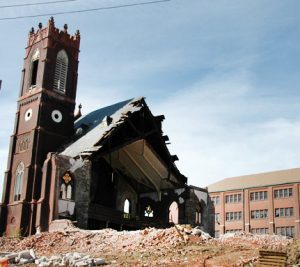 Two of the most common terms that we hear when working with churches are Conditional Use Permits and Grandfathered in. Although there seems to be a basic understanding of zoning and how it relates to a use being Grandfathered in, most need further explanation as to how it will affect their church in the future as a legal nonconforming use.
Two of the most common terms that we hear when working with churches are Conditional Use Permits and Grandfathered in. Although there seems to be a basic understanding of zoning and how it relates to a use being Grandfathered in, most need further explanation as to how it will affect their church in the future as a legal nonconforming use.
Zoning:
All property has an underlying or specific zone wherein the City or County has set forth in its General Plan for all zones within their jurisdiction. These zones indicate what the general, current, or future use of the land in a particular area will be. The purpose of this is to maintain continuity throughout the city while providing for the health, safety, morals, and general welfare of its residents. In short, it prevents things such as a steel mill from taking place in the middle of a neighborhood. Notwithstanding, the underlying or specific zone, and the General Plan zone, at any one time, may both be different.
Nonconforming Use:
This occurs when a piece of land is being used in a manner that is not currently in conformance with the current zoning laws and was originally different, but then legal. The example I see the most is when there is a church in the middle of a block of surrounding single family homes. It’s not always the case, but often the church was built without a need for what is known as a Conditional Use Permit, and at a time when the church use was permitted by zoning rights. In other words, although the underlying zoning of the church was residential, at the time the church was built, either its use was permitted in that zone, or the zone was different altogether, but the church was still permitted by zoning rights.
In these instances, the church use is commonly known as Grandfathered in. Its current use is nonconforming to the current zone but was legal at the time it was built…Legal Nonconforming Use.
Buried in the zoning codes, a city will allow this nonconforming use to continue provided it does not cease for a specific period of time. Usually six months or a year. Provided your church continues to worship on the property without the statutory period lapsing, the church use may continue. Even without a Conditional Use Permit, which is otherwise then needed if certain types of additional use are expanded, usually building expansion, or uses that were not part of or allowed under the current zoning.
Notwithstanding, often when an original zone is changed, a governmental entity may impose that by a certain period (an amortized period of time) the grandfathered use must end, and any future use must then conform to the new current zone in place.
It is also worth noting that some governmental entities also provide that should the building(s) be substantially destroyed, remodeled, or expanded, usually by a certain percent, the nonconforming use may no longer continue.
Precautions:
Every governmental entity is different. You should check with the local planning department prior to moving forward with either a purchase or expansion. You will want to make sure you don’t have to meet current regulations if the use is, or was, discontinued for a statutory period of time; build a new or structure expanded, or the building(s) are destroyed.
Prior to purchasing a property, make sure your intended use is permitted under the current zoning laws by right or a Conditional Use Permit in place, or at the time it was constructed (grandfathered), and is not subject to an amortization of time. Although some cities will not certify or otherwise confirm a Legal Nonconforming Use in writing. They will provide access to any Conditional Use Permits, Building Permits, or other related materials, including applicable government codes under the Public Information Act. None, however, can provide legal advice. Only general information
It is then important to review and understand such documents or seek professional advice, which is always recommended. This is especially true of any existing Conditional Use Permit, which may even itself contain an amortization period. The Permit Conditions what is allowed, and by default what is not allowed. Violate the Conditions, and with cause. and due process, the Conditional Use Permit can be revoked,
Don’t allow any of the above to scare you away from the church property you were led to, or vision therewith. If necessary, consult an attorney who is especially experienced and intimately familiar with land use and zoning laws.
Please see our other related articles.
Church Officer and Director Liability
How Zoning Code Effect’s Church Property Use
Conditional Use Permits
How Eminent Domain and Inverse Condemnation Affect Churches
Disclaimer: Every situation is different and particular facts may vary thereby changing or altering a possible course of action or conclusion. The information contained herein is intended to be general in nature as laws vary between federal, state, counties, and municipalities and therefore may not apply to any given matter. This information is not intended to be legal advice or relied upon as a legal opinion, course of action, accounting, tax or other professional service. You should consult the proper legal or professional advisor knowledgeable in the area that pertains to your particular situation.
